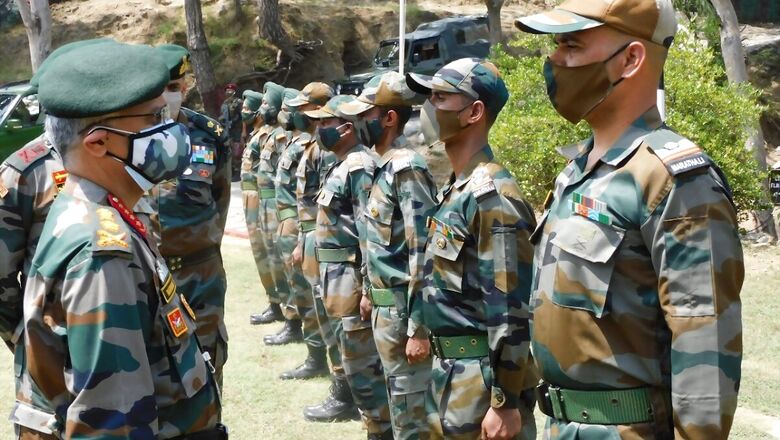
views
Land is a precious resource especially in a country with a population of more than 1.3 billion and aspiring to be an economic power. Indian Railways and Ministry of Defence (MoD) are the two biggest holders of land in the country. While railway ministers have often spoken of monetizing surplus land belonging to railways during their budget speeches, the MoD had never toyed with such an idea until now.
However, several times in the past, attempts have been made to change ownership of the defence land, primarily at behest of some people in power. No effort has ever been made to enact a legislation as is being planned now in the form of the Cantonment Bill. It would be of interest to know that a separate set up under the MoD called the Defence Estates headed by the Director General of Defence Estates (DGDE) manages the defence land.
Isolation of cantonments from the civilian population started in 1765 with the establishment of the first cantonment at Barrackpore because it was considered necessary by the Britishers prior to Independence. Some degree of separation of sensitive defence establishments is required even now due to security considerations in view of the fast changing nature of unconventional threats. The recent drone attack at the Jammu airbase is one case in point besides the attack on military families at Kaluchak military station near Jammu in 2002.
Funding the defence budget to meet the national security requirements is always a big challenge for any government since India lies in a volatile neighbourhood besides having unsettled borders with two nuclear neighbours. Dilemma of the government between development and defence persists all the time. Monetizing surplus defence land is one of the options to bridge this ever-increasing deficit. While the proceeds from monetizing can at best make a small contribution to the defence budget, an assurance that this amount will go into the non-lapsable Modernization Fund for Defence and Internal Security is another challenge. Normally all such proceeds are credited to the consolidated fund of India.
Another aspect of managing defence land is its peace-time administration. Large civilian population who reside in the cantonments are governed by the Cantonment Act which denies them the benefits of development available to other citizens living in areas governed by the municipal corporations. Municipal corporations receive funds from state governments besides their own income. New legislation aims to address this shortcoming so that civilians residing in the cantonments also get their due share of funds from the state governments.
Management of defence land involves several stakeholders including military, Public Sector Undertakings (PSUs), Ordnance Factory Board, Defence Research and Development Organisation, other departments of MoD besides the civilians who reside in the Cantonments which needs an elaborate management system provided by the DGDE and the Cantonment Boards. Audit of the defence land to assess the requirements of the armed forces based on laid down scales has been done periodically. Findings of these audits reflect that armed forces are still deficient of land. This does not imply that the armed forces are utilizing all the land in their possession.
ALSO READ | For First Time in 250 Yrs, India to Bring About Extensive Changes in Defence Land Policy
Military units and establishments require land which meets their strategic and security requirements in terms of location and size (acreage), whereas MoD holds substantial land at places where it has no use in the present or future. There is a need to identify such chunks of land as also compile details of requirement of the armed forces including locations and size keeping in mind the future security requirements.
Concept of Equal Value Infrastructure (EVI) which is under consideration as part of the Cantonment Bill 2020 is a progressive thought wherein any defence land which is required for developing key public use infrastructure will be compensated by equal value infrastructure for the armed forces. This practice has been in vogue in some projects executed by the Delhi Metro even in the past but its formalization will make implementation of infrastructure projects faster in future through quicker decision making process. EVI should also be applicable in case the MoD needs land for their projects by bartering surplus defence land of equal value which the MoD does not need because of its location and size.
Military cantonments located in the middle of some metros have often been commented upon. It must be remembered that these areas were the outskirts of these towns when these cantonments were established and it has taken the military decades of hard work to make such cantonments envy of some. It is interesting to note that 62 cantonments constitute only 1.65 acres of the 17.95 acres of defence land as per the DGDE. These cantonments are also the lung of these cities and their commercialization will be an environmental disaster for such cities. However, there are camping grounds on prime commercial land along major national highways which have little peace-time or military value for the armed forces. While these are managed by the Defence Estates, military authorities are required to provide human resources for ‘ward and watch’, which is a gross waste of armed forces’ manpower. Many of them have been encroached upon, some even by the state governments. It would be prudent to exchange such land for equal value land at locations which are strategically and administratively beneficial to the armed forces.
Proposals along these lines have often been made in the past without tangible results. Situation is likely to improve once the government formalizes these measures as part of the impending legislation/s.
Another issue which merits attention of the government is the huge Old Grant Bungalows whose 99-year lease has expired and the powerful occupants continue to hold onto them based on legal or bureaucratic premises. These are unbelievably valuable prime properties which if monetized can fetch substantial funds to the exchequer which can be utilized for modernization of the armed forces.
Defence land reforms were long overdue in light of the changing strategic and economic environment of the country post-Independence. While economy is pivotal to national security, it is important to involve all stakeholders especially the armed forces while enacting such landmark legislation so that no compromises are made on war preparedness and national security while undertaking land reforms. A win-win solution for all stakeholders is the way forward.
The views expressed in this article are those of the author and do not represent the stand of this publication.
Read all the Latest News, Breaking News and Coronavirus News here.




















Comments
0 comment